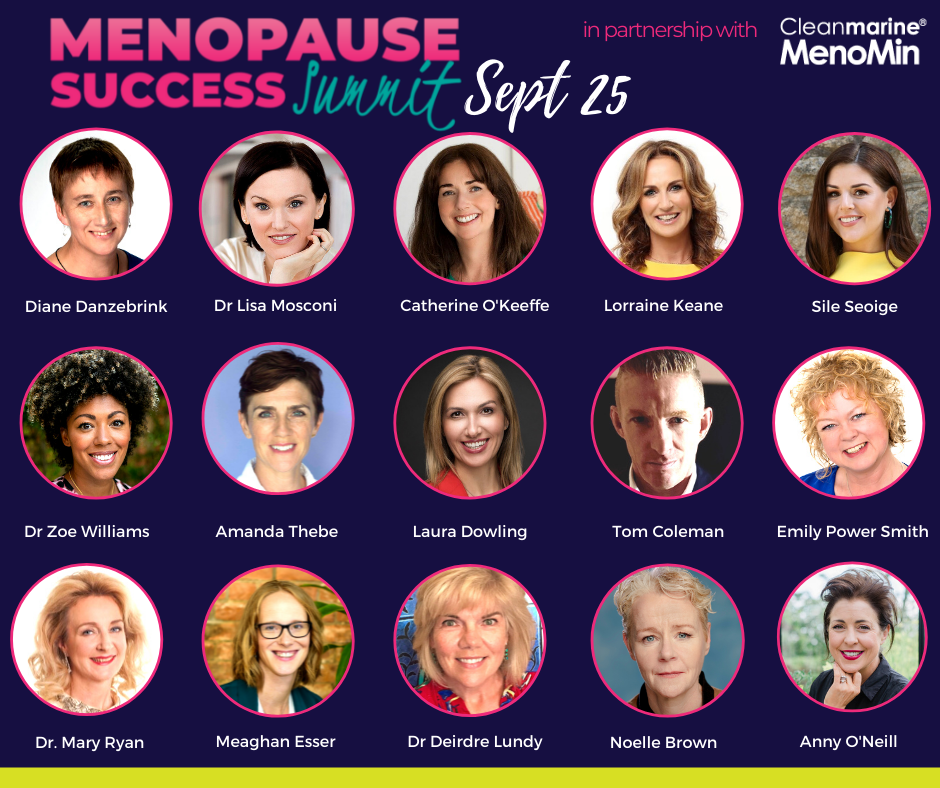Ireland’s leading menopause coach Catherine O’Keeffe shares practical career advice to help women to successfully navigate their menopause journey

The menopause is still something many women struggle to open up about. Silently managing symptoms as they try to carry on with everyday activities can make this stage of life even more challenging.
The Menopause Success Summit on 25 September is all about providing women with information and inspiration to help them to seek out the support and care they need in all aspects of life. Here, we sit down with the founder, Ireland’s leading menopause coach Catherine O’Keeffe, to get advice for women on how to stay well, focused and find support in the workplace when going through the menopause.

How might menopause affect a woman physically at work and what can help?
The key symptoms that can play havoc on a work day are insomnia, brain fog, anxiety, loss of confidence, hot flushes. That is not to say the many other symptoms don’t also impact. Each of these symptoms takes a targeted approach to support at work. If we take insomnia for example, that will trigger anxiety the next day, brain fog will be heightened also, you might suffer memory loss which feeds into loss of confidence. It’s important to look at your treatment options and empower yourself with knowledge in relation to HRT, holistic therapies – it’s never one size fits all. The lifestyle aspects and daily habits are key too as we want good habits to support us through these years.
Emotionally, menopause is challenging too. How might the emotional effects of menopause affect a woman at work?
Until you get a handle on your symptoms and get your own personal toolkit in place, menopause can be a vulnerable time. This can be very evident in the workplace where your confidence may not be as strong, your self-esteem can take a hit, and on top of that you may have fluctuating and changing moods which can make your working day more difficult.
What can workplaces do to be more supportive of women during the menopause?
This comes in many guises but the first step is supporting the conversation about menopause in a respectful manner. Educating both employees and managers is a key step – so often managers will tell me they have no idea how far reaching the symptoms of menopause are and how they can impact on the workplace. A little education goes a long way when it comes to menopause! Then it’s practical steps that you can take, like fans on desks, more rest breaks where needed, understanding and empathy are key. A menopause policy or guidance paper is also a good addition to every workplace but in my opinion education and the practical steps are crucial and all need to be reinforced by top down management support.
Practical steps could include anything from adding a range of herbal teas that help alleviate symptoms, to healthy food choices in the canteen, having a counsellor that staff can call on for confidential support, for example your Employee Assistance Program, all the way to choosing the right health insurance plans with added benefits for women’s health and wellbeing.
Having a conversation with bosses or colleagues about menopause must be daunting for many women. What tips do you have?
This certainly can feel daunting, but the flipside is the importance and benefits of getting support from those you work with. We know support in menopause is crucial, not just at home but in your workplace too. I completely understand how difficult the first conversation can be though. It can send you into a hot flush just thinking about it! Keep your focus on the end goal which is support that will help you through this transition, and this support is not just for a few weeks or months – it’s for years. Menopause can average from four to 10 years. When it comes to talking to your manager, preparation is key and this starts with giving her/him notice. Ideally you want to give at least a week’s notice before you sit down for a chat as this will allow your manager time to ensure they are fully comfortable and up to speed on how they can support you in menopause.
I would recommend sending an email or having a brief chat to say you would like to sit down in a week’s time to chat about your menopause symptoms and how you feel they are impacting on your workday. Then prepare – get your notes ready (remember with brain fog it’s easy to forget what you want to talk about), role play in advance. You will be nervous, that’s a given but role playing in the mirror or with a friend can make all the difference. And go into the meeting with solutions – for example if urinary issues are a challenge you may request a desk closer to the toilets, if your uniform is exacerbating hot flushes you may need to look at the material contained – synthetic materials can wreak havoc on hot flushes. Practical solutions can make a big difference to your working life, and I’ve included some examples to get you thinking below.
Opening up with your colleagues can be a different experience but equally as nerve wracking. You will know who is a trusted confidant at work that you can chat with. Above all, normalise it whenever you can. Talking openly about menopause is the way forward.
What will women learn about menopause and the workplace at the Menopause Success Summit?
The Menopause Success Summit will cover the key aspects of menopause from HRT to weight management, brain fog and sleep to sexual health. We have taken areas that women wanted to learn more about and woven them into what I know will be a jam packed empowering and educational day for women. With a host of international medical and scientific experts on board, you are guaranteed the latest in up-to-date advice, and I’ll be focusing in particular on the topic of menopause in the workplace.
The Menopause Success Summit is live online event running on 25 September, 10am-5pm. Top international medical and scientific experts will share advice on how you can thrive through your menopause. Book tickets at menopausesuccessummit.com.

Main image: Karolina Grabowska from Pexels








